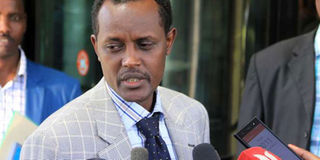We embolden the corrupt when we politicise the anti-corruption fight

Ethics and Corruption Commission CEO Halakhe Waqo addresses the media at Integrity Centre on November 25, 2016. PHOTO | JEFF ANGOTE | NATION MEDIA GROUP
What you need to know:
- In Kenya, we have surrendered and agreed to be hoodwinked by politicians who are the very beneficiaries of corruption.
- I am convinced that we do not need more anti-corruption institutions other than the police, prosecution and courts.
The fight against corruption has fallen victim to murky times.
Murkiness is a euphemism for politicisation of the anti-corruption fight.
By its very nature, politicising anything is similar to surrender; in essence a decision not to do anything.
In Kenya, we have surrendered and agreed to be hoodwinked by politicians who are the very beneficiaries of corruption.
To achieve the surrender objective, Kenyans ‘accept’ that corruption is beyond our ability to fight and there is nothing we can do about it.
In turn, corruption has morphed into the sanctioned way of enriching oneself in Kenya.
Bad luck if you do not have access to means of corruption.
Politics protects the corrupt and we, the voters, prefer and love corrupt politicians being in charge of our country.
Worse, politicians know how foolishly gullible we are.
That explains why when they are caught red-handed, they always rush back to their ‘home’ base to blame Raila Odinga.
To fight corruption, we multiplied the anti-corruption institutions.
I am convinced that we do not need more anti-corruption institutions other than the police, prosecution and courts.
Most of the additional institutions, especially anti-corruption authorities, are part of the mechanism of sustaining corruption rather than deterring or eliminating it.
TRICKERY
They are a public relations exercise that the corrupt use to psychologically convince us that someone is fighting corruption.
History is instructive here. For some time, through a combination of external donor and internal civic pressures, discussion on governance was narrowed to corruption.
The multilateral and bilateral partners zeroed down to something appropriately nicknamed ‘good governance.’
To implement this thing, demands were made to roll back the state through privatisation.
One variant of this privatisation that was meant to fight the so-called peculiar problem of the African state was to hire into top government positions private sector actors who were appropriately re-baptised the ‘dream team’ and set up special anti-corruption agencies.
It was hoped the dream team would be sufficiently detached from the state as to be able to clean it off corruption. The dream team failed miserably.
Similarly, the anti-corruption authority was a spectacular failure with numerous heads of the authority resigning in ignominy.
Now, we have opted to outsource the fight against corruption to technology.
Whether we are referring to procurement in government or counting electoral votes, we over-glorify technology.
When technology ‘fails,’ like it did in the 2013 elections or through IFMIS, we don’t blame the bad manners and deficit of values that characterise our national political culture.
Lost in all these is that, as a country, we still glorify thieves and invite them to church to donate ill-gotten wealth. Technology cannot but be socialised into this thieving culture.
PROVE IT
When we have human culture devoid of values and integrity and that favours wealth derived from looting of public resources, technology yields to those bad manners.
Strikingly, we are blind to the professionalism of the few among us, including the Auditor-General or the audit team at the Health ministry, whose diligence exposed the graft.
The fight against corruption must be nested in the professionalism, conviction, steadfastness and integrity of such fine public servants.
These servants have endured in silence the abuse, threats, and intimidation from the politicians in government.
Their silence is instructive. It provides a fine contrast with the petty and unproductive noises of the Jubilee government led by the President and his deputy.
One humorous Facebook entry estimates that the two must have mentioned Raila Odinga’s name close to 90 nine times in a span of 24 hours.
The outstanding question is: if the President or his deputy, or indeed any government agency knows that Raila Odinga or any opposition legislator is corrupt or has benefited from corruption, why are they repeatedly shouting these names in rallies instead of taking prompt action by arresting and arraigning them in court?
Godwin R. Murunga is a senior research fellow in the Institute for Development Studies, University of Nairobi





